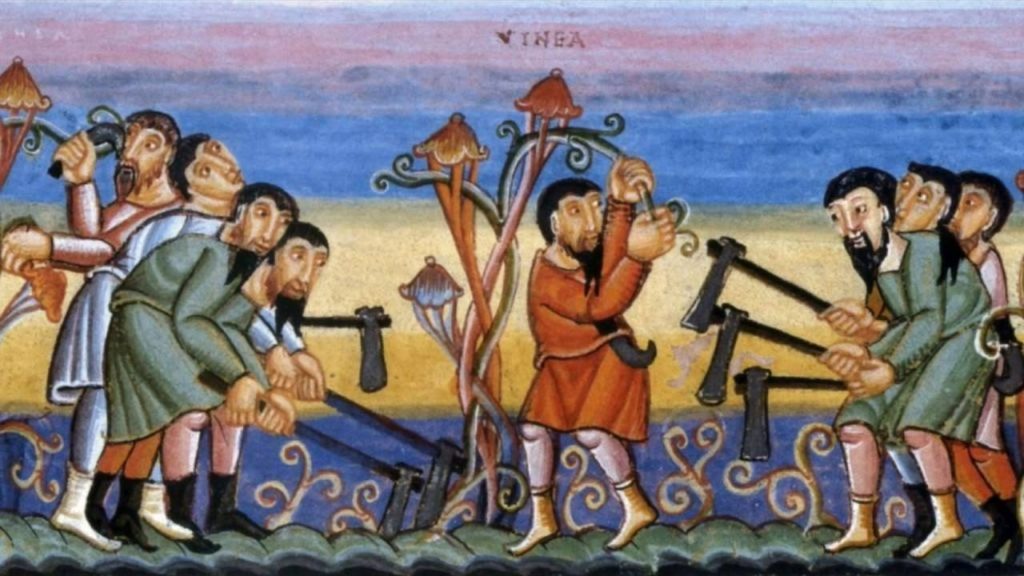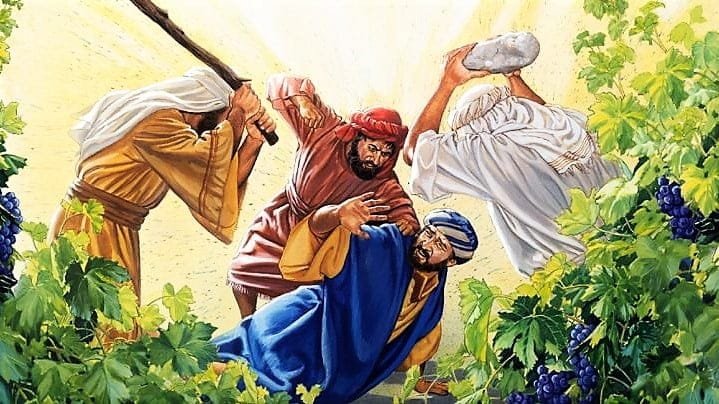FRIDAY 2ND WEEK OF LENT MASS READINGS AND COMMENTARIES:
PARABLE OF THE WICKED TENANTS
PARABLE OF THE WICKED TENANTS
MASS PRAYERS AND READINGS

READING I
Gn 37:3–4, 12–13a, 17b–28a
Israel loved Joseph best of all his sons, for he was the child of his old age; and he had made him a long tunic. When his brothers saw that their father loved him best of all his sons, they hated him so much that they would not even greet him.
One day, when his brothers had gone to pasture their father’s flocks at Shechem, Israel said to Joseph, “Your brothers, you know, are tending our flocks at Shechem. Get ready; I will send you to them.”
So Joseph went after his brothers and caught up with them in Dothan. They noticed him from a distance, and before he came up to them, they plotted to kill him. They said to one another: “Here comes that master dreamer! Come on, let us kill him and throw him into one of the cisterns here; we could say that a wild beast devoured him. We shall then see what comes of his dreams.”
When Reuben heard this, he tried to save him from their hands, saying, “We must not take his life. Instead of shedding blood,” he continued, “just throw him into that cistern there in the desert; but do not kill him outright.” His purpose was to rescue him from their hands and return him to his father. So when Joseph came up to them, they stripped him of the long tunic he had on; then they took him and threw him into the cistern, which was empty and dry.
They then sat down to their meal. Looking up, they saw a caravan of Ishmaelites coming from Gilead, their camels laden with gum, balm and resin to be taken down to Egypt. Judah said to his brothers: “What is to be gained by killing our brother and concealing his blood? Rather, let us sell him to these Ishmaelites, instead of doing away with him ourselves. After all, he is our brother, our own flesh.” His brothers agreed. They sold Joseph to the Ishmaelites for twenty pieces of silver.
RESPONSORIAL PSALM
R. Remember the marvels the Lord has done.
When the Lord called down a famine on the land
and ruined the crop that sustained them,
He sent a man before them,
Joseph, sold as a slave.
R. Remember the marvels the Lord has done.
They had weighed him down with fetters,
and he was bound with chains,
Till his prediction came to pass
and the word of the Lord proved him true.
R. Remember the marvels the Lord has done.
The king sent and released him,
the ruler of the peoples set him free.
He made him lord of his house
and ruler of all his possessions.
R. Remember the marvels the Lord has done.
GOSPEL
Mt 21:33–43, 45–46
Jesus said to the chief priests and the elders of the people: “Hear another parable. There was a landowner who planted a vineyard, put a hedge around it, dug a wine press in it, and built a tower. Then he leased it to tenants and went on a journey. When vintage time drew near, he sent his servants to the tenants to obtain his produce. But the tenants seized the servants and one they beat, another they killed, and a third they stoned. Again he sent other servants, more numerous than the first ones, but they treated them in the same way. Finally, he sent his son to them, thinking, ‘They will respect my son.’ But when the tenants saw the son, they said to one another, ‘This is the heir. Come, let us kill him and acquire his inheritance.’ They seized him, threw him out of the vineyard, and killed him. What will the owner of the vineyard do to those tenants when he comes?” They answered him, “He will put those wretched men to a wretched death and lease his vineyard to other tenants who will give him the produce at the proper times.” Jesus said to them, “Did you never read in the Scriptures:
The stone that the builders rejected has become the cornerstone; by the Lord has this been done, and it is wonderful in our eyes?
Therefore, I say to you, the Kingdom of God will be taken away from you and given to a people that will produce its fruit.” When the chief priests and the Pharisees heard his parables, they knew that he was speaking about them. And although they were attempting to arrest him, they feared the crowds, for they regarded him as a prophet.
Gospel Commentary from the Navarre Bible, Commentary to the Gospel of St. Matthew (with permission)
- 33-46 This very important parable completes the previous one. The parable of the two sons simply identifies the indocility of Israel; that of the wicked tenants focusses on the punishment to come.
- Our Lord compares Israel to a choice vineyard, specially fenced, with a watchtower, where a keeper is on the look-out to protect it from thieves and foxes. God has spared no effort to cultivate and embellish his vineyard. The vineyard is in the charge of tenant farmers; the householder is God, and the vineyard, Israel (Is 5:3-5; Jer 2:21; Joel 1:7).
- The tenants to whom God has given the care of his people are the priests, scribes and elders. The owner’s absence makes it clear that God really did entrust Israel to its leaders; hence their responsibility and the account he demands of them.
- The owner used to send his servants from time to time to collect the fruit: this was the mission of the prophets. The second despatch of servants to claim what is owing to the owner — who meet the same fate as the first — refers to the way God’s prophets were ill-treated by the kings and priests of Israel (Mt 23:37; Acts 7:42; Heb 11:36-38).
- Finally he sent his Son to them, thinking that they would have more respect for him; here we can see the difference between Jesus and the prophets, who were servants, not “the Son”: the parable indicates singular, transcendental sonship, expressing the divinity of Jesus Christ.
- The malicious purpose of the tenants in murdering the son and heir to keep the inheritance for themselves is the madness of the leaders in expecting to become undisputed masters of Israel by putting Christ to death (Mt 12:14; 26:4).
- Their ambition blinds them to the punishment that awaits them. Then “they cast him out of the vineyard, and killed him”: a reference to Christ’s crucifixion, which took place outside the walls of Jerusalem.
- Our Lord compares Israel to a choice vineyard, specially fenced, with a watchtower, where a keeper is on the look-out to protect it from thieves and foxes. God has spared no effort to cultivate and embellish his vineyard. The vineyard is in the charge of tenant farmers; the householder is God, and the vineyard, Israel (Is 5:3-5; Jer 2:21; Joel 1:7).
- Jesus prophesies the punishment God will inflict on the evildoers: he will put them to death and rent the vineyard to others.
- This is a very significant prophecy: St Peter later repeats it to the Sanhedrin: “this is the stone which was rejected by you builders, but which has become the head of the corner” (Acts 4:11; 1 Pet 2:4).
- The stone is Jesus of Nazareth, but the architects of Israel, who build up and rule the people, have chosen not to use it in the building. Because of their unfaithfulness the Kingdom of God will be turned over to another people, the Gentiles, who will give God the fruit he expects his vineyard to yield (cf. Mt 3:8-10; Gal 6:16).
- For the building to be well built, it needs to rest on this Stone. Woe to him who trips over it! (cf. Mt 12:30; Lk 2:34), as first Jews and later the enemies of Christ and his Church will discover through bitter experience (cf. Is 8:14-1 5).
- Christians in all ages should see this parable as exhorting them to build faithfully upon Christ and make sure they do not fall into the sin of this Jewish generation.
- We should also be filled with hope and a sense of security; for, although the building — the Church — at some times seems to be breaking up, its sound construction, with Christ as its cornerstone, is assured.
Stay safe and God bless! Fr. Rolly Arjonillo
SEE AS WELL:
VIDEO COMMENTARY ON THE 1ST READING
TOPIC: CAN SIBLING RIVALRY EVER BE GOOD FOR YOU?
In today’s first reading, Joseph, the youngest sibling among twelve sons, is sold into slavery by his brothers. They were envious of him for being the favorite of their father, Jacob. Jacob was the son of Isaac, who was the son of Abraham. It is not uncommon for siblings to fight, and as they grow up, fights can separate them permanently. But God can bring something good even in bad.
Stay updated: subscribe by email for free TO OUR NEW WEBSITE www.catholicsstrivingforholiness.org (PUT YOUR EMAIL IN THE SUBSCRIBE WIDGET).
We are also in www.fb.com/Catholicsstrivingforholiness. Kindly help more people in their Christian life by liking our page and inviting your family, friends and relatives to do so as well. Thanks in advance and God bless you and your loved ones! Fr. Rolly Arjonillo
